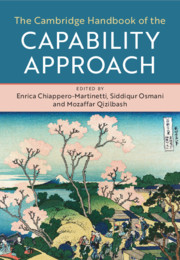Book contents
- The Cambridge Handbook of the Capability Approach
- The Cambridge Handbook of the Capability Approach
- Copyright page
- Dedication
- Contents
- Figures
- Tables
- Contributors
- Foreword
- Acknowledgements
- General Introduction
- Part I Historical Antecedents and Philosophical Debates
- Part II Methods, Measurement and Empirical Evidence
- Part III Issues in Public Policy
- Introduction to Part III
- 25 On Education and Capabilities Expansion
- 26 Capability Approach to Children’s Well-Being and Well-Becoming
- 27 Capability and Disability
- 28 Social Exclusion and Capability Development
- 29 Human Security
- 30 Income Inequality and Human Capabilities
- 31 The Capability Approach and Human Rights
- 32 Capabilities and the Law
- 33 Capabilities, Public Reason and Democratic Deliberation
- 34 Entitlements and Capabilities
- 35 Religion and the Capability Approach
- Index
- References
25 - On Education and Capabilities Expansion
from Part III - Issues in Public Policy
Published online by Cambridge University Press: 11 November 2020
- The Cambridge Handbook of the Capability Approach
- The Cambridge Handbook of the Capability Approach
- Copyright page
- Dedication
- Contents
- Figures
- Tables
- Contributors
- Foreword
- Acknowledgements
- General Introduction
- Part I Historical Antecedents and Philosophical Debates
- Part II Methods, Measurement and Empirical Evidence
- Part III Issues in Public Policy
- Introduction to Part III
- 25 On Education and Capabilities Expansion
- 26 Capability Approach to Children’s Well-Being and Well-Becoming
- 27 Capability and Disability
- 28 Social Exclusion and Capability Development
- 29 Human Security
- 30 Income Inequality and Human Capabilities
- 31 The Capability Approach and Human Rights
- 32 Capabilities and the Law
- 33 Capabilities, Public Reason and Democratic Deliberation
- 34 Entitlements and Capabilities
- 35 Religion and the Capability Approach
- Index
- References
Summary
The capability to be educated is arguably crucial for human development everywhere. The corresponding opportunities, processes and outcomes are therefore of global and national significance for sustainable development and more equal societies. The chapter explores the intrinsic and instrumental ways in which education matters in the capability approach for a life with well-being and agency freedoms and achievements. It goes on to consider the articulation of structural arrangements in society with fairness and equality in education, including how intersecting conversion factors reveal the relationship of resources, individual opportunity and social enablements or constraints, and the significance of context in shaping capabilities. The chapter asks whether we should put capabilities or functionings, or both, in the evaluative space when looking at education, and briefly, if we need normatively to select some core capabilities to underpin quality and flourishing in and through capability-facing education. Human capital for economic growth, which currently dominates education policies globally and nationally, is then discussed as a particular challenge to capabilities. Finally, the chapter considers aspirations in order to illustrate how these different aspects might come together in the space of education.
- Type
- Chapter
- Information
- The Cambridge Handbook of the Capability Approach , pp. 505 - 522Publisher: Cambridge University PressPrint publication year: 2020

